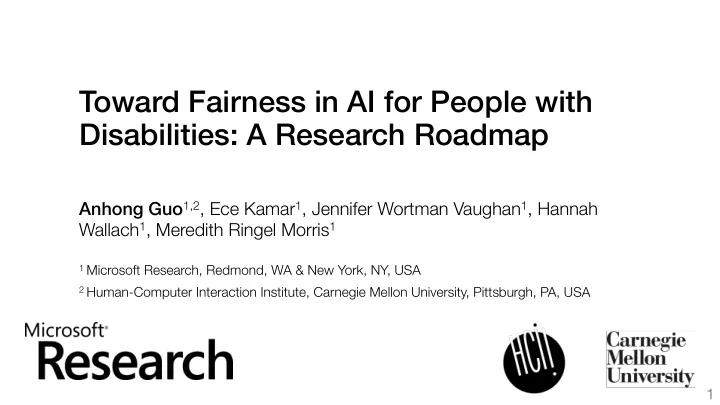

Toward Fairness in AI for People with Disabilities: A Research Roadmap Anhong Guo 1,2 , Ece Kamar 1 , Jennifer Wortman Vaughan 1 , Hannah Wallach 1 , Meredith Ringel Morris 1 1 Microsoft Research, Redmond, WA & New York, NY, USA 2 Human-Computer Interaction Institute, Carnegie Mellon University, Pittsburgh, PA, USA 1
Fairness in AI for People with Disabilities • AI has huge potential to impact the lives of people w/ disabilities • Speech recognition: caption videos for people who are deaf • Language prediction: augment communication for people w/ cognitive disabilities 2
Fairness in AI for People with Disabilities • AI has huge potential to impact the lives of people w/ disabilities • Speech recognition: caption videos for people who are deaf • Language prediction: augment communication for people w/ cognitive disabilities • However, AI systems may not work, or worse, discriminate/harm • If smart speakers do not recognize people with speech disabilities • If a chatbot learns to mimic someone with a disability • If self-driving cars do not recognize pedestrians using wheelchairs 3
Research Roadmap 1. Identify potential inclusion issues of AI systems 2. Test hypotheses to understand failure scenarios 3. Create benchmark datasets for replication and inclusion 4. Innovate new methods and techniques to mitigate bias 4
Research Roadmap 1. Identify potential inclusion issues of AI systems A. Categorization of AI capabilities • Modalities: vision, audio, text, etc. • Task: • Recognition: detection, identification, verification, analysis • Generation • Integrative AI: combinations of the above 5
Research Roadmap 1. Identify potential inclusion issues of AI systems B. Risk assessment of existing AI systems • Computer vision: face, body, object, scene, text recognition • Speech systems: speech recognition, generation, speaker analysis • Text processing: text analysis • Integrative AI: information retrieval, conversational agents 6
Research Roadmap 1. Identify potential inclusion issues of AI systems C. General AI techniques • Outlier detection: completion time to determine input legitimacy • Aggregated metrics: Accuracy, F1, AUC, MSE • Definition of objective functions • Datasets: fail to capture use cases, lack representation of diverse groups 7
Research Roadmap 1. Identify potential inclusion issues of AI systems D. Types of harm by unfair AI • Quality of service Quantitative • Harms of allocation Benchmarking • Denigration Qualitative Investigation • Stereotyping • Over- or under-representation 8
Research Roadmap 2. Test hypotheses to understand failure scenarios 3. Create benchmark datasets for replication & inclusion Ethical issues involved in data collection • Is it acceptable to create such datasets by scraping existing online data? • How to preserve users’ privacy, while ensures ground-truth labels? • Potential harms of aggregating data about disability? • If curating data from scratch, how can we encourage contributions? • How to obtain consent for people with intellectual disabilities? 9
Research Roadmap 2. Test hypotheses to understand failure scenarios 3. Create benchmark datasets for replication & inclusion Potential data collection approach • First use online sources to perform exploratory analysis; Then use web data call asking people to contribute data • Dataset should not be re-distributed due to ethical concerns; instead, use evaluation servers to support benchmarking by others 10
Research Roadmap 4. Innovate new methods and techniques to mitigate bias • Evaluate how much existing bias mitigation techniques work • Design new modeling, bias mitigation, and error measurement techniques 11
Thanks! aka.ms/AIa11y Research Roadmap 1. Identify potential inclusion issues of AI systems 2. Test hypotheses to understand failure scenarios 3. Create benchmark datasets to support replication and inclusion 4. Innovate new methods and techniques to mitigate bias Anhong Guo, CMU HCII https://guoanhong.com anhongg@cs.cmu.edu 12
Recommend
More recommend